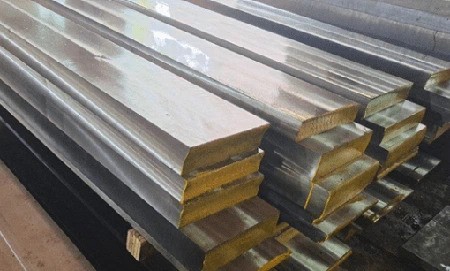Tel: 0129-4001010 Phone: +91 730 321 5033
Email: cs@absoluteveritas.com
BIS CERTIFICATION FOR QUENCHED AND TEMPERED ALLOY STEEL FORGINGS IS 12145:1987
In today's competitive landscape, maintaining market presence without a certified, high-quality product can be challenging. Obtaining a BIS license may also be essential for selling products in the Indian market. To achieve BIS certification and ensure product quality, manufacturers must adhere to the specified Indian standards.
Let's delve deeper into at IS 12145:1987 for quenched and tempered alloy steel forgings for pressure vessels.
This standard outlines the criteria for quenched and tempered alloy steel forgings utilized in pressure vessels, including those within reactor systems. It encompasses forgings designed for various vessel components like closures, flanges, shells, tube sheets, heads, rings, and similar parts.
Per IS 12145:1987, forgings are categorized into three grades: I, II, and III, determined by chemical composition (C, Mn) and Alloy Content (Ni, Cr, Mo), along with Mechanical Properties (YS, TS, Elongation, Impact).
As per IS 12145:1987, forgings are classified into three grades: I, II, and III, based on their chemical composition (C, Mn) and alloy content (Ni, Cr, Mo), as well as mechanical properties (YS, TS, Elongation, Impact).
The standard dictates the general material supply prerequisites. Forgings are mandated to be crafted from killed steel, sourced from primary processes like open hearth, basic oxygen, or electric furnace, with the potential inclusion of secondary steel production methods.
To guarantee uniform deformation across sections, forgings should undergo mechanical hot working using an appropriate method. Following hot working, the forgings must be cooled to achieve full austenite transformation without encountering any adverse effects such as cracking or distortion.
All forgings are required to undergo heat treatment, comprising quenching and tempering processes. Subsequently, after tempering, the forgings must undergo gradual cooling from the tempering temperature. Finished forgings must undergo product analysis, and their mechanical properties must align with the standards specified.
TESTS
The subsequent test must be conducted for Quenched and Tempered alloy steel forgings for pressure vessels.
-
Chemical composition analysis
-
Mechanical tests
-
Appearance
-
Shapes, dimensions and tolerances
-
Ultrasonic testing
MARKING
Every forging must bear a stamp indicating the material grade, heat number or identification mark, and the manufacturer's trademark. Additionally, the standard mark (ISI Mark) may be applied to the forgings. To utilize the standard mark (ISI Mark), the manufacturer must acquire a BIS license from the Bureau of Indian Standards. This license is granted following a thorough evaluation of manufacturing infrastructure, production processes, and quality control and testing capabilities during an inspection of the manufacturing premises.
PROCESS FOR BIS ISI MARK CERTIFICATION

BIS CERTIFICATION PROCESS
Acquiring a BIS license requires a comprehensive review of manufacturing infrastructure, quality control abilities, testing resources, and production procedures. This thorough assessment guarantees that products not only adhere to regulations but also prioritize consumer safety and reliability.
NOTE:
For comprehensive guidance on the BIS ISI Certification process, please explore:
WHY USE ABSOLUTE VERITAS?
Absolute Veritas is a prominent organisation from the private sector of India primarily dealing with the Inspection, Testing, Audits, Certification of products& consulting services to various industries in India and worldwide, ensuring compliance with regulatory standards and industry requirements. Offering a comprehensive range of services including product certification, testing, training, auditing, and compliance services, Absolute Veritas helps manufacturers and importers achieve higher production efficiency and quality standards.
Absolute Veritas (AV) will handle end to end pre-registration request, sample preparation, documentation, testing and application process for FMCS Certification
For any questions regarding the most recent update on FMCS registration licenses, please reach out to us via email at cs@absoluteveritas.com








 ❮
❮
